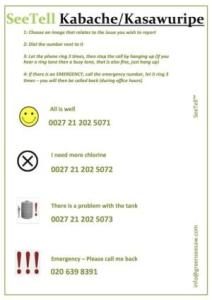NGO found ‘tapping’ into SA VOIP provider
It could be argued that water remains the most undervalued natural resource, and this is most evident in places where getting clean water is a simple process of opening a tap.
Now, imagine if things weren’t that easy. Imagine if the only source of water was kilometres away and your only mode of transport was your two trusty feet. Some may think that in this day and age, it simply sounds ridiculous, but in reality there are people who are confronted with this very real problem every day, especially in Africa.
David Schaub-Jones has made it his life’s work to support communities like this in desperate need of help, and seeing the potential that technology can have to bring about change, made it his goal to improve water delivery and sanitation services in Africa through the use of new technology. In the process, the South African social enterprise SeeSaw was founded. But, while the idea was birthed, the next step was finding the technology that would make that idea a reality.
When David Schaub-Jones approached David Jagu – Founder of Wanatel – with one of SeeSaw’s ideas, there was no question that Wanatel would step in and help. Wanatel prides itself in creating custom solutions, and when the solution is geared to assist the misfortunate, the company is more motivated than ever. Wanatel has a belief that there are no problems, only solutions waiting to happen.
The problem: SeeSaw is working with a social enterprise (CWS) that assists women in Northern Ghana to establish small businesses, training them how to treat water and sell it to their communities. As the villages they live in are remote, field staff from CWS would only be able to visit them once every few weeks to check their systems, bring new supplies and assist with maintenance. CWS was concerned that issues might arise between those visits that would deprive the communities of safe water. The ladies could have called to signal these issues, but not all of them had cellphones and the money involved in making a call acted as a disincentive.
The solution: The entrepreneurs were given six different DID numbers to call for six different situations. When they called this number, it would ring a few times and drop the call, so the women were not charged cellphone credit for reporting. On the other end, SeeSaw would receive the call and log the situation reported. The six situations were: 1. All is well 2. I need more chlorine 3. I need more buckets 4. My tap is broken 5. There is a problem with the tank 6. Emergency! Please call back. Each call was routed on Wanatel’s VoIP to a database run by SeeSaw.
The outcome: In Ghana, the reporting system – leveraging the fact that people can borrow phones to make free calls – has helped field staff to respond to problems faster, leading to better service for customers and more sustainable entrepreneurs. Since the early days, the system has been scaled up – both in Ghana and now in Angola. Wanatel is providing SeeSaw with 150 DID numbers that allow SeeSaw to engage with water systems that serve almost 200 000 people, allowing them to be in contact 24/7, 365 days a year.



